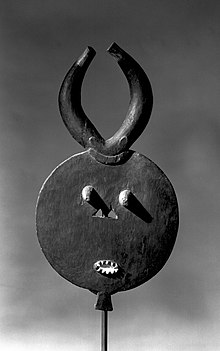This article is written like a personal reflection, personal essay, or argumentative essay that states a Wikipedia editor's personal feelings or presents an original argument about a topic. (June 2020) |



Traditional African masks are worn in ceremonies and rituals across West, Central, and Southern Africa. They are used in events such as harvest celebrations, funerals, rites of passage, weddings, and coronations. Some societies also use masks to resolve disputes and conflicts.[1]
For example, members of the masquerade cult and Uma-Ada fraternity facilitate social justice and reconciliation processes among Igbo communities in Eastern Nigeria through masquerade performances.[citation needed] Mende and Vai women of the Sande society in Sierra Leone don the Sowei mask during rites of passage, specifically initiation ceremonies for young girls.[2] The Plank Mask (Nwantantay) among the Bobo, Bwa, and Mossi people of Burkina Faso makes an appearance during public events such as funerals and agricultural festivals.[3]
- ^ "What Are African Masks?". TheCollector. 2022-04-20. Retrieved 2024-04-23.
- ^ Kart, Susan (2020). "The Missing Women of Sande: A Necessary Exercise in Museum Decolonization". African Arts. 53 (3): 72–83. doi:10.1162/afar_a_00539. S2CID 221092172 – via Project MUSE.
- ^ Clark, Christa (2006). The Art of Africa: A Resource for Educators. Metropolitan Museum of Art. p. 71.